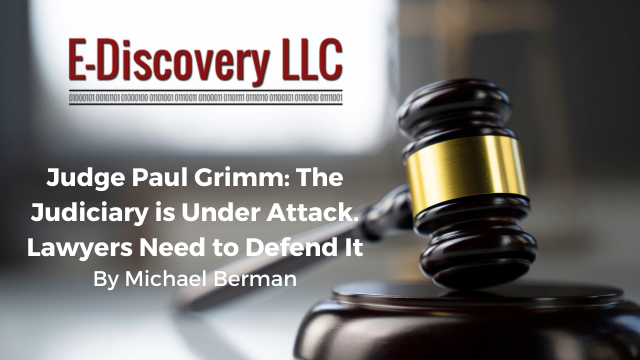
[EDRM Editor’s Note: The opinions and positions are those of Michael Berman.]
The Hon. Paul W. Grimm, a retired U.S. District Judge, wrote an article, The Judiciary Is Under Attack. Lawyers Have a Duty to Defend It (bloomberglaw.com)(Oct. 24, 2023).
As Judge Grimm points out, here in Maryland a Circuit Court Judge was murdered in his driveway last week. While no one has been arrested and convicted, news media reports focus on a disgruntled litigant in a custody proceeding. Maryland Judge Andrew Wilkinson killed on his driveway by suspect involved in a divorce case, authorities say – CBS News
According to Judge Grimm’s article, the U.S. Marshals Service reported more than 4,500 threats to judges in 2021. And, a disgruntled litigant killed the son, and wounded the husband, of a U.S. District Judge in 2020.
So, who will defend the judges and the judiciary? The answer is clear: The legal profession must—now, and with a renewed sense of urgency.
The Hon. Paul W. Grimm, a retired U.S. District Judge, wrote an article, The Judiciary Is Under Attack. Lawyers Have a Duty to Defend It ,(bloomberglaw.com)(Oct. 24, 2023)
Maryland District Court Chief Judge John Morrissey said that seven “credible threats” were made against District Court judges in 2022. Maryland will have to reckon with judge’s assassination – The Baltimore Banner The news report adds: “That’s just a glimpse. A spokesperson for the Maryland Judiciary said that while the U.S. Marshals Service records threats against federal judges, local law enforcement oversees courthouse security in each Maryland county. There is no central record of threats.” Id. Perhaps there should be a central record. The Baltimore Banner article reports a threat to kill an appeals court judge and social media posts threatening two judges.
As he always does, Judge Grimm goes directly to the heart of the issue:
If, as too frequently happens, inaccurate, unfair, and unjustified attacks against judges are left unchallenged, public perception of the integrity and impartiality of the targeted judges and the judiciary as a whole are undermined, and confidence in the judicial system diminishes…. [W]hen criticism is materially inaccurate or misrepresents the legal system or a judge, or when criticism seriously and negatively impacts the community and the administration of justice, a response is needed.
.Id.
Judge Grimm adds:
Without the respect of the public and its willingness to adhere to judgments and orders issued by the courts, the rule of law—which is essential to the viability of our democracy—is imperiled. The steady drumbeat of unjustified attacks against the judiciary and individual judges threatens the safety of judges and diminishes faith in judges and courts. Responses to those unfair attacks, sadly, are not keeping up. Supreme Court Justice Samuel Alito has called out the bar’s failure to defend the justices, but most judges don’t speak on this issue.
So, who will defend the judges and the judiciary? The answer is clear: The legal profession must—now, and with a renewed sense of urgency.
Id.
After the murder of Judge Wilkinson, the Maryland State Bar Association distributed a tribute and wrote that: “MSBA supports increasing the safety and security of judges and other court personnel throughout Maryland to ensure they can continue their important work without fear.” Maryland State Bar Association Mourns the Tragic Loss of Judge Andrew Wilkinson | Maryland State Bar Association – MSBA. That message remembering the Judge for his “immense contributions” was appropriate.
However, as Judge Grimm points out, more needs to be done. The American Bar Association has said that it will respond “to unjust criticism of the judiciary….” Members of the Committee on the American Judicial System (americanbar.org). Judge Grimm is right.


